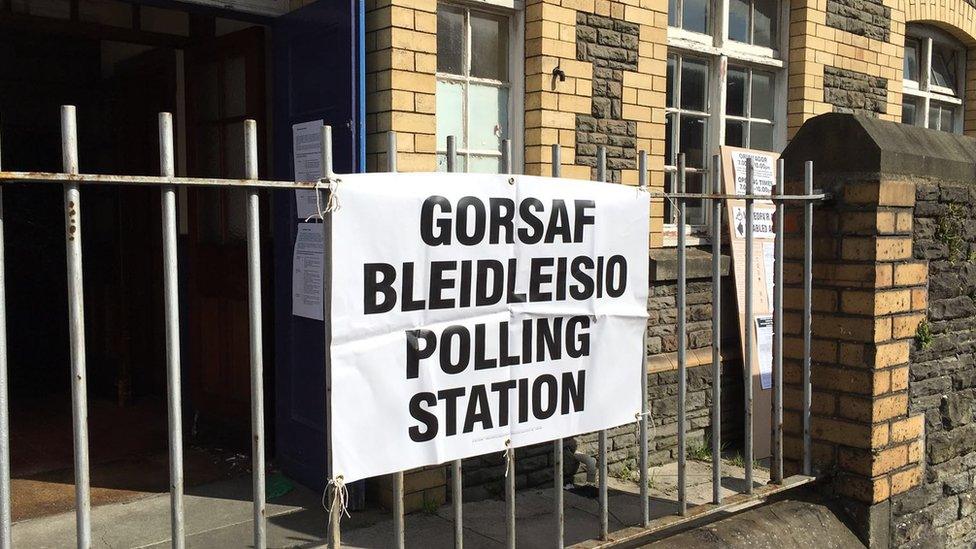£1.5m wasted on early voting trial, say Conservatives
- Published

This was the first time early voting in person was allowed in Wales
Few voters took advantage of the chance to vote early in four council areas in May's local elections, the Electoral Commission has said.
People in Blaenau Gwent, Caerphilly, Torfaen and some parts of Bridgend were able to vote in advance of 5 May.
In Blaenau Gwent just 68 people voted early over two days, with only 1,791 people doing so across the four areas.
The Tories said the £1.5m spent on the pilot projects had been wasted but Welsh ministers defended the trials.
The Welsh government said that what had been learned "will be used to inform longer term improvements to the way people vote".
How did the early voting system work?
Council offices in Ystrad Mynach and Pontypool were opened for residents of Caerphilly county borough and Torfaen to cast their ballot on the Saturday and Sunday before polling day the following Thursday.
People in Blaenau Gwent could vote the following Tuesday, and Wednesday at Coleg Gwent in Ebbw Vale.
Early voting took place over the same two days in seven Bridgend council wards, where turnout was low in 2017, and also pupils aged sixteen and over could cast their ballot in Cynffig Comprehensive School on the Tuesday.
Votes for 16 and 17-year-olds in Welsh local and Welsh Parliament elections were introduced before the 2021 Senedd poll.
How many people voted early in the four council areas?
Bridgend had the most early voters - 1,374 or 1.5% of the turnout in that council area.
Caerphilly had 187 (0.2%), Torfaen 162 (0.3%) and Blaenau Gwent 68 (0.2%).
Across Wales turnout dropped by 3%, from 42% to 39%, compared to the previous local elections in 2017.
In Blaenau Gwent it fell 7.5% to 32.%, in Torfaen the number voting reduced by 6.2% to 31.3%, in Bridgend it was down 3.7% to 36.2% and Caerphilly's turnout was 3.4% lower at 32.9%.
The Electoral Commission said the results of the early voting pilots "indicate that the opportunity to vote in-person ahead of polling day does not, on its own, boost turnout significantly".
"This is not unexpected as we know that people's motivation to vote is driven by a range of factors, not solely linked to convenience or choice of method," the elections watchdog said.
'Eyewatering' cost per vote cast
Mick Antoniw, the Welsh government's Counsel General, or chief legal adviser, who is also Minister for the Constitution, said the experiments "demonstrated that flexible and more convenient ways of voting can be provided securely and with voters' confidence".
"The learning from the pilots and the evaluation will be used to inform longer term improvements to the way people vote and to help reduce the democratic deficit."
But Welsh Conservative constitution spokesman Darren Millar said the exercise had cost "an eyewatering £845 per vote cast".
"Voters in Wales already have the opportunity to vote early and conveniently by using postal votes so these pilots were completely unnecessary," he said.
"The ability of the Welsh Labour government to generate new ways of wasting taxpayers' money never ceases to amaze me."

ROYAL WELSH SHOW 2022: Visitors return to Llanelwedd after a three-year wait
IOLO: A WILD LIFE: Iolo delves into the archives from the past 25 years
